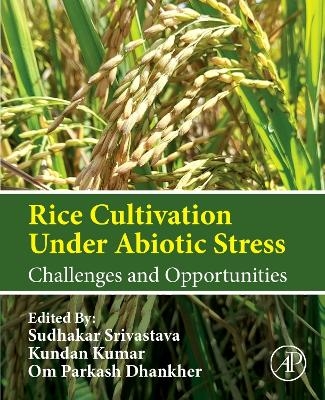
Rice Cultivation Under Abiotic Stress
Academic Press Inc (Verlag)
978-0-443-21793-7 (ISBN)
- Noch nicht erschienen (ca. April 2025)
- Versandkostenfrei
- Auch auf Rechnung
- Artikel merken
Dr. Sudhakar Srivastava is presently working as an Assistant Professor at the Institute of Environment and Sustainable Development (IESD), Banaras Hindu University (BHU). He completed his M.Sc. and Ph.D. in Botany at the University of Lucknow. He also served as a Scientific Officer at Bhabha Atomic Research Centre (BARC), Mumbai from 2009 to 2014. He has more than seventeen years of research experience in the field of plant-metal interactions, with a major focus on arsenic stress responses in plants. He has published 90 research articles and 30 review and letter articles in high-impact international and national journals. He has also received several awards for his contributions, including a Young Scientist Award from the National Academy of Sciences, India (NASI), Allahabad in 2011, Young Scientist Award from Uttar Pradesh Council of Science & Technology (UPCST) in 2013-2014, and Young Scientist Award from the Science and Engineering Research Board (SERB) in 2015. Dr. Srivastava is also an Associate of the National Academy of Agricultural Sciences (NAAS) and Fellow of International Society of Environmental Botanists (ISEB), Lucknow. He is a life member of several societies as well as non-governmental organizations and serves as an Editorial board member of Frontiers in Sustainable Food Systems, International Journal of Phytoremediation, and Acta Physiologiae Plantarum. Dr. Kundan Kumar is presently working as an Associate Professor at the Department of Biological Sciences, Birla Institute of Technology & Science Pilani, K. K. Birla Goa Campus. He completed his Ph.D. in Plant Molecular Biology at National Institute of Plant Genome Research, New Delhi, India. He did his post-doctoral studies at University of Massachusetts Amherst, USA and McGill University, Canada from 2009 to 2012. He has more than fifteen years of research experience in the area of Plant Molecular Biology and Stress Physiology. He has published more than 50 publications in International and National Journal of repute. He was recipient of a project under Young Scientist scheme by Department of Science & Technology, India. He is a life member of The Indian Science Congress Association and Society for Plant Biochemistry and Biotechnology. He was a reviewer for various International Journals and serves as an Academic Editor for two International journals, Gene and PLOS One. Dr. Om Parkash Dhankher is a Professor of Crop Biotechnology in the Stockbridge School of Agriculture at the University of Massachusetts, Amherst, USA. He received his PhD in Plant Molecular Biology from Durham University (United Kingdom) on a prestigious Commonwealth Fellowship and did his postdoctoral studies at the University of Georgia, Athens, USA. He has more than 30 years of experience in research, teaching, and administration and has active international research collaborations. He has published over 120 peer reviewed publications, 4 edited books, 5 international patents, over 150 abstracts & conference proceedings. Dr. Dhankher is a Fellow of the two largest international agriculture societies--Crop Science Society of America (CSSA) and Agronomy Society of America (ASA), in addition to the selected Fellow of the International Society of Environmental Botanists (ISEB), and the Indian Society of Plant Physiology (ISPP)in addition to having received many awards and honors.
Section A: Rice: An introduction to the crop and cultivation methods
1. Rice production at global level: Current status, challenges and future scenarios
2. Rice crop: A treasure of genetic resource
3. Rice crop production from nursery to post-harvesting treatment
4. Rainfed and irrigation based rice cultivation: the importance of water
5. Fertilization methods for rice cropping from inorganic to integrated approach
Section B: Rice cultivation faced with several environmental stresses
6. Salt stress responses and its management in rice
7. Rice drought stress tolerance and its management
8. Submergence and waterlogging tolerance in rice
9. Rice cultivation in the wake of global warming and heat
10. Cold stress tolerance mechanisms in rice
11. Microplastics in rice
12. Rice cultivation under nutrient limitation
13. Organic pollutants fate in paddy fields and rice grains
14. Arsenic in rice: A serious worldwide problem
15. The prevalence of acid soils and their effect on rice crop cultivation
16. Worsening air quality with pollutants: The effects on rice crop
17. Ozone in the air and its impact on rice crop quality and production
Section C: Methods to mitigate the stress and enhance rice production
18. Fertilizer amendments to tackle toxic metal accumulation and nutrient limitation in rice
19. Water management for managing arsenic accumulation in rice
20. Chemical and hormonal amendments to improve stress tolerance of rice
21. Microbial interventions to manage abiotic stresses in rice
22. Climate resilient rice
23. Current updates on improving CO2 diffusion inside the rice leaves for resource use efficiency
24. Genome editing for rice stress tolerance
25. Role of artificial intelligence in precision rice cultivation for environmental stress tolerance
26. GIS and remote sensing applications in rice cultivation
27. Modern tools in rice crop production: Machine based phenotyping and drones
28. The role of traditional breeding in tackling abiotic stress in rice crops
29. Speed breeding: A novel method to fasten rice breeding for abiotic stress tolerance
| Erscheint lt. Verlag | 1.4.2025 |
|---|---|
| Verlagsort | San Diego |
| Sprache | englisch |
| Maße | 191 x 235 mm |
| Themenwelt | Naturwissenschaften ► Biologie ► Ökologie / Naturschutz |
| Weitere Fachgebiete ► Land- / Forstwirtschaft / Fischerei | |
| ISBN-10 | 0-443-21793-9 / 0443217939 |
| ISBN-13 | 978-0-443-21793-7 / 9780443217937 |
| Zustand | Neuware |
| Informationen gemäß Produktsicherheitsverordnung (GPSR) | |
| Haben Sie eine Frage zum Produkt? |
aus dem Bereich


